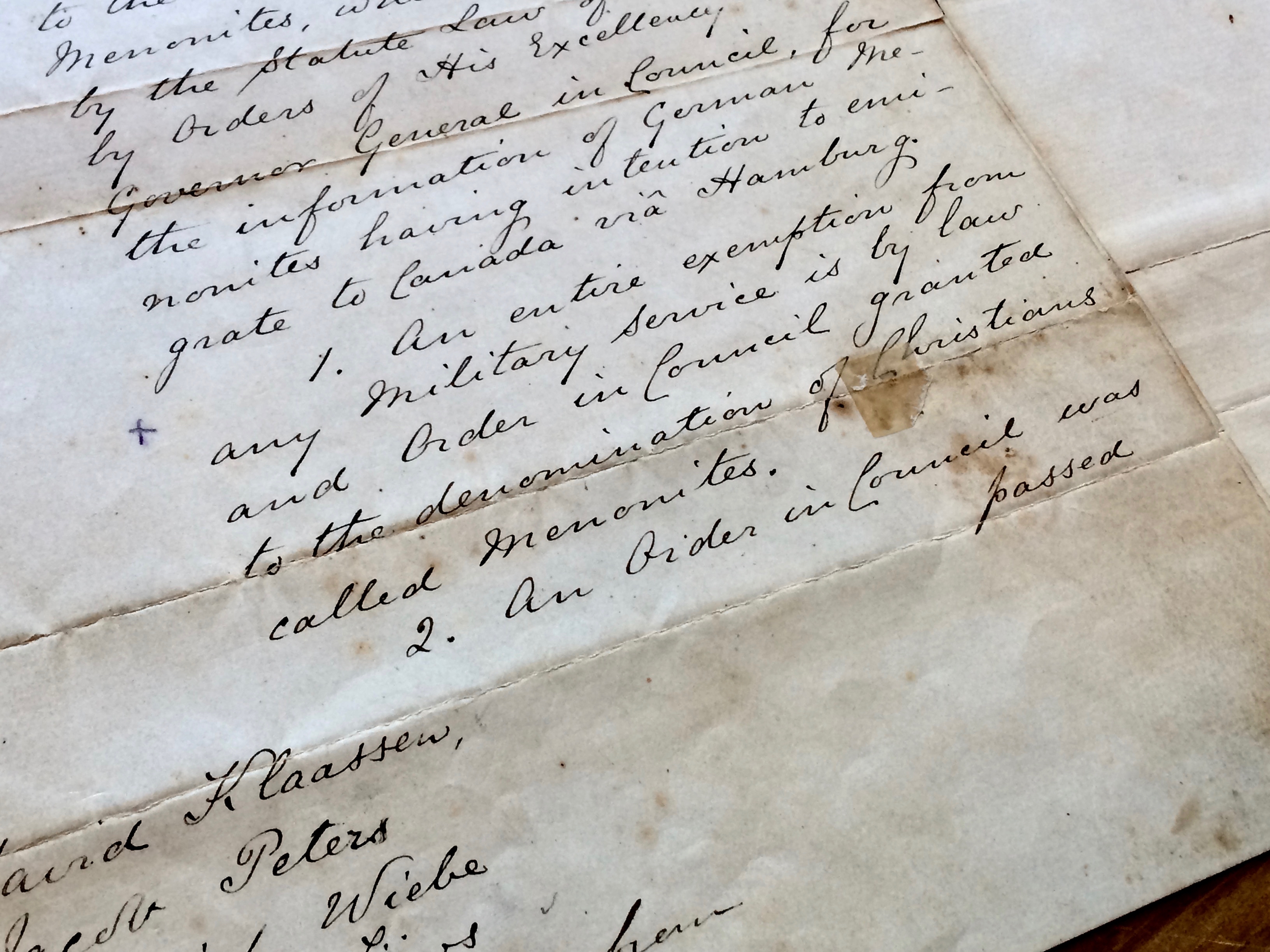Privilegium Of 1873 (Canada) on:
[Wikipedia]
[Google]
[Amazon]
 The Privilegium of 1873 (sometimes called "The Lowe Letter") is the original invitation letter from the Dominion of
The Privilegium of 1873 (sometimes called "The Lowe Letter") is the original invitation letter from the Dominion of
 The Privilegium of 1873 (sometimes called "The Lowe Letter") is the original invitation letter from the Dominion of
The Privilegium of 1873 (sometimes called "The Lowe Letter") is the original invitation letter from the Dominion of Canada
Canada is a country in North America. Its ten provinces and three territories extend from the Atlantic Ocean to the Pacific Ocean and northward into the Arctic Ocean, covering over , making it the world's second-largest country by tot ...
to Mennonites
Mennonites are groups of Anabaptist Christian church communities of denominations. The name is derived from the founder of the movement, Menno Simons (1496–1561) of Friesland. Through his writings about Reformed Christianity during the Radic ...
living in the Russian Empire
The Russian Empire was an empire and the final period of the Russian monarchy from 1721 to 1917, ruling across large parts of Eurasia. It succeeded the Tsardom of Russia following the Treaty of Nystad, which ended the Great Northern War. ...
offering them land, military exemption, and private schools, among other privileges. Because of their pacifist beliefs, Mennonites were known to migrate to other countries in order to maintain their lifestyles. When migrating, they signed agreements with their host countries. These agreements were known as Privilegium or "Privileges." A similar Privilegium had been signed with Catherine the Great
, en, Catherine Alexeievna Romanova, link=yes
, house =
, father = Christian August, Prince of Anhalt-Zerbst
, mother = Joanna Elisabeth of Holstein-Gottorp
, birth_date =
, birth_name = Princess Sophie of Anhal ...
of Russia when Mennonites first immigrated from Prussia
Prussia, , Old Prussian: ''Prūsa'' or ''Prūsija'' was a German state on the southeast coast of the Baltic Sea. It formed the German Empire under Prussian rule when it united the German states in 1871. It was ''de facto'' dissolved by an em ...
to the Russian Empire
The Russian Empire was an empire and the final period of the Russian monarchy from 1721 to 1917, ruling across large parts of Eurasia. It succeeded the Tsardom of Russia following the Treaty of Nystad, which ended the Great Northern War. ...
in the 1770s.
In 1873, twelve Mennonite delegates from southern Russia set out to North America to investigate new lands. Of the 12 delegates, four decided to accept Canada's offer of land in the newly formed province of Manitoba
Manitoba ( ) is a Provinces and territories of Canada, province of Canada at the Centre of Canada, longitudinal centre of the country. It is Canada's Population of Canada by province and territory, fifth-most populous province, with a population o ...
. Representatives of the Bergthaler and Kleine Gemeinde Kleine Gemeinde is a Mennonite denomination founded in 1812 by Klaas Reimer in the Russian Empire. The current group primarily consists of Plautdietsch-speaking Russian Mennonites in Belize, Mexico and Bolivia, as well as a small presence in Canada ...
churches, David Klassen, Jacob Peters, Heinrich Wiebe, and Cornelius Toews, signed the agreement with John Lowe, Secretary of the Canadian Department of Agriculture, and beginning in 1874 and the years that followed, 21,000 Mennonites immigrated to this part of Canada, including the East Reserve
The East Reserve was a block settlement in Manitoba set aside by the Government of Canada exclusively for settlement by Russian Mennonite settlers in 1873 (although settlement did not occur until 1874). Most of the East Reserve's earliest settlers ...
as established in the original agreement and later the West Reserve The West Reserve was a block settlement plot of land in Manitoba set aside by the Government of Canada exclusively for settlement by Russian Mennonite settlers in 1876.
After signing Treaty 1 with the Anishinabe and Swampy Cree First Nations, the C ...
and other areas.
The Privilegium was referred to by Canadian Mennonites to defend their right to be Conscientious Objectors
A conscientious objector (often shortened to conchie) is an "individual who has claimed the right to refuse to perform military service" on the grounds of freedom of thought, conscience, or religion. The term has also been extended to object ...
during both World War I
World War I (28 July 1914 11 November 1918), often abbreviated as WWI, was one of the deadliest global conflicts in history. Belligerents included much of Europe, the Russian Empire, the United States, and the Ottoman Empire, with fightin ...
and World War II
World War II or the Second World War, often abbreviated as WWII or WW2, was a world war that lasted from 1939 to 1945. It involved the vast majority of the world's countries—including all of the great powers—forming two opposin ...
. During the 1920s, many conservative Mennonites left Canada for Mexico and Paraguay after the Canadian government broke the promise of private school as agreed in the Privilegium.
The original document was rediscovered in 2015 in the Chortitzer Church basement in Steinbach. The document is now housed at the Mennonite Heritage Archives at the Canadian Mennonite University
Canadian Mennonite University (CMU) is a private Mennonite university located in Winnipeg, Manitoba, Canada, with an enrollment of 1607 students. The university was chartered in 1999 with a Shaftesbury campus in southwest Winnipeg, as well as M ...
in Winnipeg
Winnipeg () is the capital and largest city of the province of Manitoba in Canada. It is centred on the confluence of the Red and Assiniboine rivers, near the longitudinal centre of North America. , Winnipeg had a city population of 749,6 ...
.
References
{{DEFAULTSORT:Privilegium of 1873 1873 in Manitoba 1873 documents